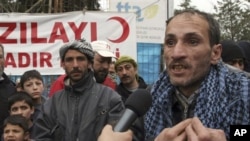Syrian refugees have crossed into Turkey in growing numbers in recent days, frightened by a government assault on the northern Syrian city of Idlib, near the border with Turkey. The latest influx of refugees has led to growing unease in Ankara.
Hundreds of refugees fleeing the fighting in Syria have crossed into Turkey since Saturday, when Syrian forces launched an assault on the opposition stronghold of Idlib. Sinan Ulgen, head of the international relations think tank EDAM, says the Turkish government is wary.
"In 1991, when Saddam had started to massacre his Kurdish population, Turkey ended being host to 550,000 Kurds in a few days. That still remains on the consciousness of Turkish policymakers and there have been a number of lessons drawn from that," Ulgen said.
Ankara says Syrians fleeing the fighting are welcome. According to Turkish officials, Turkey is hosting some 12,000 refugees.
Turkish Foreign Ministry spokesman Selcuk Unal says they are prepared for any development. "Of course, Turkey is ready for any kind of eventuality, if the crisis is getting to worse situation. But on that, we will continue monitoring the situation on a continuous basis," Unal said.
But the government says it will not stand by if it is faced by a major exodus from Syria. An international relations expert for the Turkish newspaper Haberturk, Soli Ozel, says that is not an empty threat, but says Turkey does not want to act alone.
"Should there be a massive influx of refugees, Turkey would create a security zone inside (Syria), and absolutely wants the cover of some kind of international legitimacy. But for a Kosovo-type intervention, the only way plausible is for NATO to be engaged. And NATO does not even want to talk about it," Ozel said.
Ankara has been frustrated by what it sees as the failure of the United Nations Security Council to take a stronger stand against Damascus, due to vetoes by both China and Russia.
Turkey is currently working hard to build an international coalition against Syria's ongoing crackdown and is strongly backing the "Friends of Syria," a forum of around 70 countries supporting the Syrian opposition. Later this month, Turkey is to host a meeting of the group in Istanbul.
Last week, Turkish President Abdullah Gul visited Tunisia to build up support for a regional diplomatic solution to the crisis.
He said Turkey and Tunisia are opposed to arming the opposition and to foreign military intervention, which he said would worsen the situation in Syria. However, he said Tunis and Ankara are ready to contribute to an Arab League peacekeeping force in Syria.
But the failure of U.N. special representative Kofi Annan to secure a cease-fire in Syria after his visit to Damascus Saturday and Sunday dealt another blow to hopes of a peaceful resolution to the crisis.
Following Annan's visit, Syrian forces are reported to have stepped up their crackdown on opposition groups close to the Turkish border, after quelling the opposition in the city of Homs.
Annan is due to meet with Turkish Prime Minister Recep Tayyip Erdogan late Monday. But with the fighting moving closer to Turkish territory and with the growing threat of a major influx of refugees, international relations expert Ozel warns Ankara's hand could be forced into an intervention.
"Turkey will try [to] avoid it as much as it can. But it may prove impossible. You are being drawn to things rather [than] controlling the direction [in which] things are moving," Ozel said.
Syrian forces are increasing their presence on the Turkish border and according to reports, even mining the border area. It is, as a result, becoming increasingly difficult for Syrian refugees to escape into Turkey.
For now, the numbers of refugees seeking sanctuary in Turkey remains manageable. But observers say Ankara is aware that with the crisis deepening in Syria, a humanitarian crisis on its border could become all too real.









